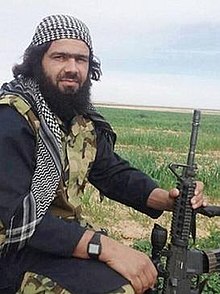Abu Waheeb
Abu Waheeb | |
|---|---|
 Abu Waheeb | |
| Native name | شاكر وهيب |
| Birth name | Shaker Wahib al-Fahdawi شاكر وهيب الفهداوي |
| Nickname(s) | Abu Waheeb (kunya) Lion of Anbar Zarqawi's student[1] Desert Lion[2] |
| Born | 1986[3] Rawah, Anbar, Iraq |
| Died | May 6, 2016 (aged 29–30)[4][5][6] Rutba, Anbar, Iraq |
| Allegiance | |
| Years of service | 2013–2016 |
| Rank | Field Commander |
| Commands | ISIL Forces in Anbar |
| Battles / wars | |
Shaker Wahib al-Fahdawi (1986 – May 6, 2016), better known as Abu Waheeb ("Father of Waheeb"; Arabic: ابو وهيب), was an Iraqi militant jihadist who was the leader of the Islamic State in Anbar, Iraq.[7] He killed three Syrian Alawite truck drivers in western Iraq in the summer of 2013,[3] and was himself killed, with three others, in a United States-led coalition airstrike in May 2016, according to the US Department of Defense.[8]
Biography
[edit]Fahdawi was born in 1986. In 2006, while studying computer science at the University of Anbar, he was arrested by US forces on charges of belonging to Al-Qaeda in Iraq. Following his arrest, Fahdawi was detained by US forces at the Camp Bucca detention facility in southern Iraq until 2009, when he was sentenced to death and moved to Tikrit Central Prison in the Saladin Governorate.[2]
Fahdawi was one of 110 detainees who escaped the prison in 2012, following an attack on the prison by forces from the Islamic State of Iraq leading to a subsequent riot within the prison.[2] He had learnt from the senior ISIS leaders he had been imprisoned with, and he became a field commander in Anbar province after his release.[2] Iraqi officials blamed him for a long list of terror-related offences and put a $50,000 bounty on him.[3]
By 2014, Fahdawi was playing an important role in leading combat operations of the group, now known as Islamic State in Iraq and the Levant, in Anbar.[9]
Death
[edit]On May 6, 2016, the Pentagon said Abu Waheeb was killed along with three others in a vehicle by a US airstrike near Rutba.[8]
Orlando nightclub shooting
[edit]According to transcripts, Omar Mateen, the perpetrator of the Orlando nightclub shooting, said that the attack was a response to the killing of Abu Waheeb.[10] Mateen stated his attack was "triggered" by a May 6, 2016 U.S. bombing strike that killed Abu Waheeb. Mateen's words were: "That's what triggered it, OK? They should have not bombed and killed Abu [Waheeb]."[11]
References
[edit]- ^ "The Rising Star of the Islamic State (ISIS) : Sunni Terrorist Abu Wahib Shakir al-Fahdawi leader of Ussud Al-Anbar Brigade". Trac.
- ^ a b c d Abbas, Mushreq (January 15, 2014). "Has al-Qaeda found Zarqawi's successor?". Al Monitor. Archived from the original on December 9, 2014. Retrieved June 24, 2014.
- ^ a b c "Bare-faced killer rises to fore of Iraq militancy". Gulf Times. August 28, 2013.
- ^ "US airstrike kills ISIS 'Emir of Anbar Province' in Iraq | Fox News Channel". Fox News Channel. May 9, 2016. Retrieved May 9, 2016.
- ^ "Senior Islamic State official in Iraq killed in air strike: Pentagon". Reuters. May 9, 2016. Retrieved May 9, 2016.
- ^ "ISIS leader for Iraq's Anbar province killed in airstrike: Pentagon". Retrieved May 9, 2016.
- ^ "Al Qaeda Is Taking Over Whole Cities in Iraq". VICE News. January 16, 2014.
- ^ a b "Islamic State leader in Iraq's Anbar killed, Pentagon says". BBC News. May 10, 2016.
- ^ "Notorious Islamic State leader killed in airstrike, Pentagon says". The Washington Post. May 9, 2016.
- ^ Sarkissian, Arek (September 24, 2016). The Associated Press (ed.). "Pulse shooter Omar Mateen told police to stop bombs in Iraq, Syria". Tallahassee Democrat. Gannett. Retrieved December 23, 2019.
- ^ Doornbos, Caitlin (September 23, 2016). "Transcripts of 911 calls reveal Pulse shooter's terrorist motives". Orlando Sentinel. Archived from the original on October 12, 2019. Retrieved September 28, 2016.
Mateen referred to a U.S.-led air strike on May 6 that killed Abu Wahib, an ISIS military commander in Iraq, and three other jihadists, according to the Pentagon. "That's what triggered it, OK?" Mateen said. "They should have not bombed and killed Abu [Waheeb]."
